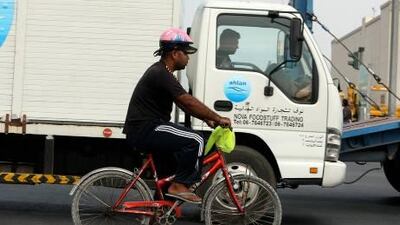DUBAI // On the highways and byways of Dubai's bustling Al Satwa district, cycle helmets are suddenly all the rage. Blue ones, silver ones, pink ones - even children's models garishly decorated with cartoon characters and perched ludicrously on the heads of grown men and, with chinstraps seldom done up, wobbling precariously as the men pedal their way about their business.
It is neither safety nor fashion that has prompted the mass adoption of headgear but economic necessity: the introduction about three months ago of a new law in Dubai dictating that cyclists must wear helmets and high-visibility jackets or face a ruinous fine of Dh500.
For Rica, a property maintenance worker from the Philippines who has been in Dubai for the best part of five years, the new law is just another minor inconvenience to deal with. Now whenever he sets off down Mankhool Road on his bike on his way to a job, he does so wearing a yellow vest and a patently useless blue cycle helmet, rendered even less effective by the fact that Rica fixes the strap over the top of the helmet, instead of under his chin.
"This one is Dh25 only, but only [made of] Styrofoam," he says. "It's not good."
Since he bought it, the new market created by the law has started to find its level: he has subsequently seen the same helmet for Dh20 or even Dh15.
Twenty-five dirhams represents a significant investment for a man earning perhaps Dh400 a week, but not as significant as an on-the-spot fine of Dh500. "It is too much money," he says, "so you have to follow the rules."
He heard about the new law only when he was stopped by police, who let him off with a caution. "They say, 'Why you are not wearing a helmet? There is a new law. We will give one chance'."
The next time, they told him: the Dh500 fine.
If a penalised cyclist does not have the money on him - unlikely, given the amount - the police confiscate your ID, he said. You can then pay the fine at Bur Dubai police station.
Such police attention is, Rica said, "a main road problem" only; he smiled and gestured towards the warren of side roads off the main street: "Not there." Over there, especially on hot days, the helmet goes in the basket, along with his tools.
But if workers such as Rica are cheerfully philosophical about the new law, the shopkeepers in the general trading stores of the bustling and predominantly South Asian district of Al Satwa, who are shifting cheap helmets as fast as they can ship them in from China, are positively delighted.
In American Sports, a shop on the corner of Al Dhiyafah Road and Mankhool Road, Sami, from Pakistan, tried to sell me a helmet remarkably like Rica's for Dh35. Perhaps mistaking my raised eyebrow as a query about quality, rather than price, he cut straight to the top of his range and produced the Chinese-made Youth Sport Helmet, mine for only Dh70. Honesty was his virtue, however, and when I asked what it was made of, he shrugged. "Polystyrene. It is not too strong," he admitted.
Quality notwithstanding, since the law came into force about three months ago, Sami said, American Sports has sold something in the region of 500 helmets and, at about Dh20 a pop, 2,000 high-visibility vests.
It was a similar story at nearby Ahmed Arab Trading, where Latif, from India, said men would wear any kind of helmet to comply with the law - even the sub-par Hello Kitty-style children's helmets for Dh25.
Across town at Wolfi's Bike Shop, frequented mainly by European leisure and racing cyclists, there was an altogether better, and considerably pricier, class of helmet on sale. One of the least expensive was the lightweight, break-resistant Uvex, made from Makrolon, a high-tech polycarbonate. Selling for Dh320 and upwards, it might cost more than 10 times its Al Satwa imitators, but it does have one significant advantage: it could actually save your life.
Nevertheless, said Wolfgang Hohmann, a keen cyclist who moved from Germany and opened Wolfi's in 2002, "I think any helmet is better than no helmet".
Obviously, he said, "it would be better if they had a helmet that really fitted. And I have even seen them on the wrong way round and some of them don't close the strap under the chin, which makes the helmet more like a sun hat than a helmet.
"But overall it's a good idea and a step in the right direction."
Less of a good idea, he said, is the Dh500 fine, "which I think is extremely excessive". It is, after all, the same amount imposed on a driver for failing to stop after an accident, for speeding at up to 20kph over the limit or for failing to give way to police or other emergency vehicles.
"I think somebody on a bicycle getting maybe 1,000 dirhams a month salary, I think if you charged them 10 dirhams it would hurt them."
Rica agreed. He was still smarting from having to shell out Dh25 for his helmet and Dh10 for his high-visibility vest. Nevertheless, as he rode away he waved cheerfully to a fellow cyclist, also sporting an unfastened helmet, and the two men enjoyed a good chuckle at the sight of each other.

